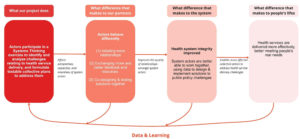Our work in this area focuses on strengthening the capacity of civil society organizations and public authorities to tackle particular service delivery challenges. We do this by supporting their efforts to operate adaptively, so that they can address the political economy dynamics that hold these challenges in place. Our primary project in this area is focused on strengthening health systems to address service delivery challenges, with work relating to the education sector in the pipeline. Our work on service delivery is informed by our experience in developing and deploying our “Treasure Hunts” methodology: a problem-focused and user-centered approach to following the money from revenues, to resource allocation, to contracts and spending, to service delivery results.
Current Projects
Strengthening Health Systems
This project, funded by the Bill & Melinda Gates Foundation, aims to support the people and organizations who are part of health systems to address the interrelated technical and political economy problems that limit the performance of those systems and their ability to deliver health services effectively. Using our Participatory Systems Thinking Approach which combines systems thinking and associated cycles of collaborative action and learning, we are collaborating with – Africa Health Innovation Centre (AHIC) to facilitate participatory systems mapping workshops with our partners Centre for Study of Adolescence in Kenya and Ipas in Malawi to address sexual reproductive health service delivery challenges.
click here
Strengthening Education Systems
Funded by the Global Partnership for Education, this project – currently in the “year zero” phase – aims to address low levels of literacy and numeracy, and inequitable learning outcomes, across five countries in southern Africa. Our partners in this initiative include Public Service Accountability Monitor (PSAM, the Agenda 2063 Academy, Stimulus Africa, and country partners from Malawi, Mozambique, Tanzania, Zambia and Zimbabwe.
Our approach involves facilitating problem-focused cycles of collaborative action and learning, which are designed to strengthen the capacity of actors involved in the design and implementation of education policies, so that they can more effectively engage in transnational spaces where decisions about financing, policies and technical assistance are often made. This in turn will mean that those decisions will take better account of countries’ needs, improving the ability of actors at national level to address the learning crisis.
